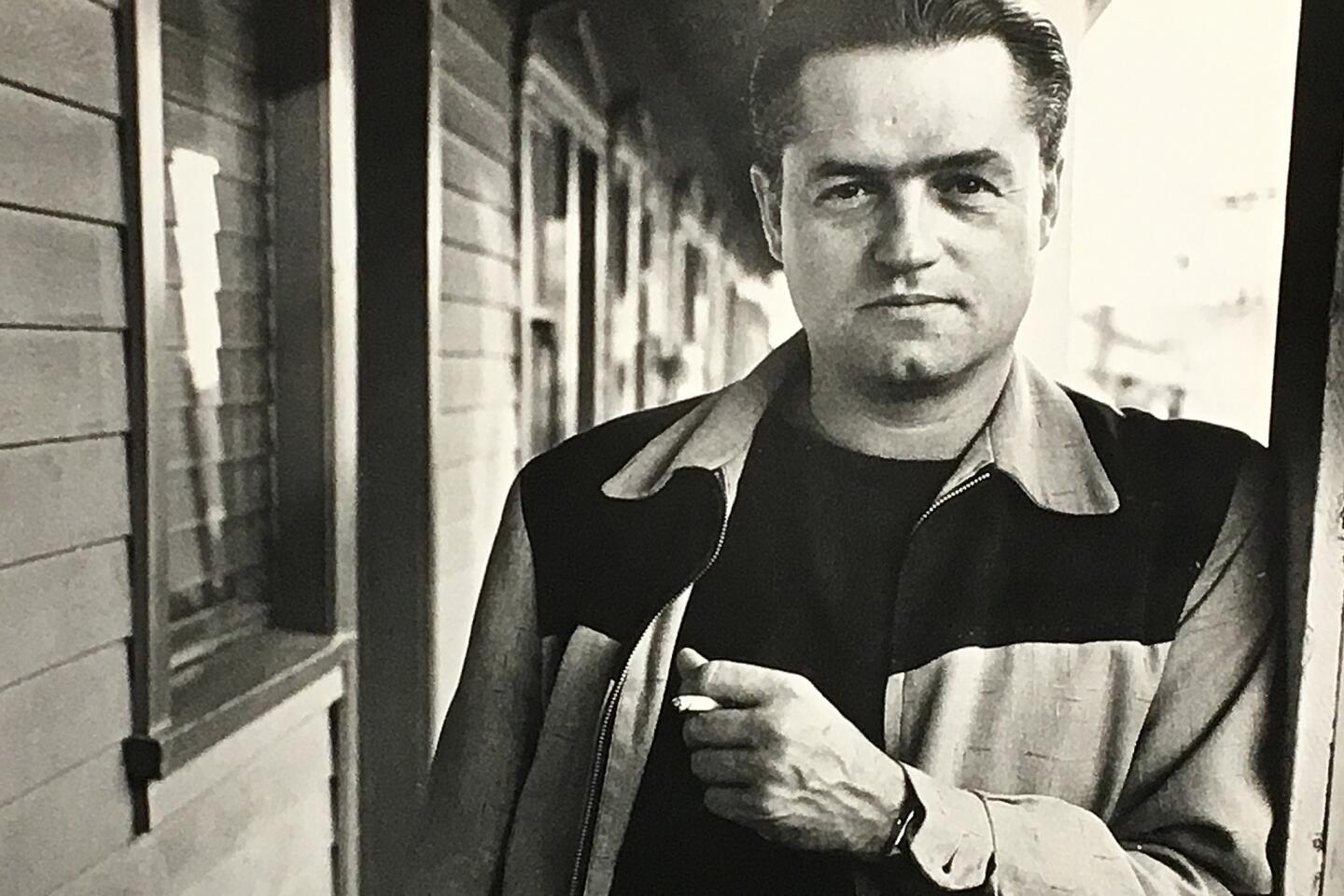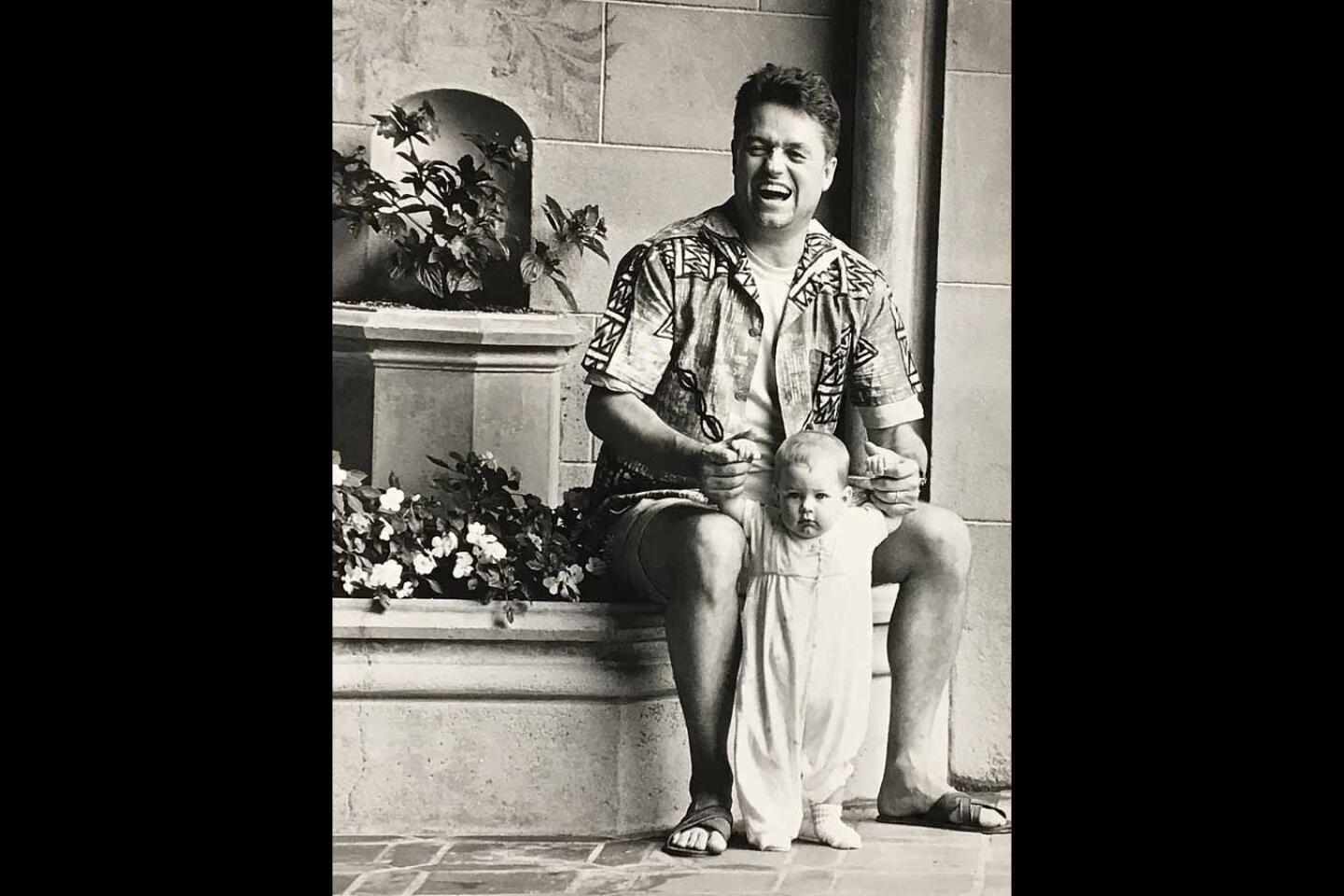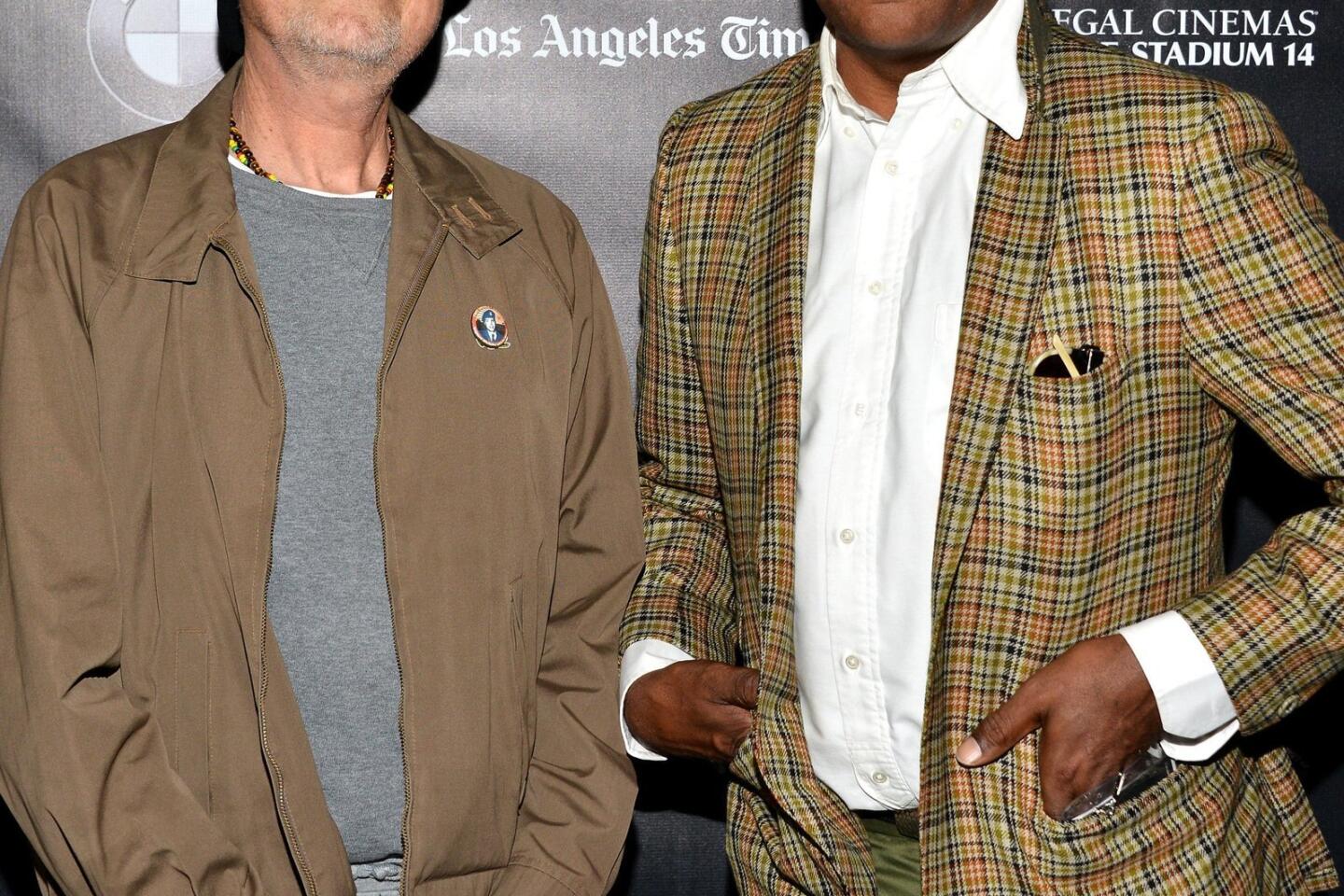From the Archives: Jonathan Demme on making ‘Married to the Mob’ and why he’s attracted to movies about independent women
- Share via
Jonathan Demme, the Academy Award-winning director of “The Silence of the Lambs,” died Wednesday at age 73. In 1988, Demme spoke to The Times about casting Dean Stockwell in “Married to the Mob” as well as his willingness to make movies about unpredictable, independent women. This article was previously published by The Times on Aug. 21, 1988.
When Jonathan Demme was hunting for an actor to play mobster Tony (The Tiger) Russo in his film “Married to the Mob,” the name Dean Stockwell wasn’t anywhere around.
The veteran character actor has been celebrated for his spectacularly creepy pimp in David Lynch’s “Blue Velvet,” as well as Harry Dean Stanton’s loyal sibling in Wim Wenders’ “Paris, Texas.” But could Stockwell play a Mafia kingpin?
“Originally I had a completely different actor in mind,” Demme said. “But then I saw Dean’s picture in a trade ad and I thought, ‘Who the hell is this? Dean Stockwell !’
“He’s such a chameleon that I didn’t even recognize him. That’s what makes him special--he has such mercurial presence as an actor.”
Demme was hooked. “Frankly, I knew that I didn’t know what to expect from Dean, which is probably what makes him so intriguing,” explained the 45-year-old New York director. During an interview in his suite at the Chateau Marmont, he was playing with his new leading lady--his 7-month-old daughter, Ramona. “All I knew was that whatever Dean would do would be completely different from the last time I saw him.”
Stockwell relished the notion of playing a mobster so much that once he fell into character, he rarely came out. “Whenever he’d come to the set, we’d treat him as Tony the Tiger, bowing and scraping, paying homage to him,” said Demme. “Dean was completely in character--talking like a gangster, walking like a gangster, always rolling his neck around like he was ready for a massage.
“Then he’d look around the set--very imperially--and say, ‘It’s so nice to see how you people operate in the movie business.’ ”
The key to “Married to the Mob’s” dizzy comic spirit is its affectionate satire of the Mafia. For Demme (and screenwriters Barry Strugatz and Mark R. Burns), the film’s gangsters aren’t malevolent thugs--they’re connoisseurs of kitsch.
As a suburban mobster housewife, Michelle Pfeiffer dwells in a home swollen with stolen goods--peeking out from behind every couch is a crate of stolen stereo equipment. (Fed up with being surrounded by all this hot property, she finally complains: “Everything we own fell off a truck!”)
As for Stockwell’s Tony the Tiger, his entire life seems devoted to bad taste. He talks shop at a Sheriff of Nottingham-style restaurant (complete with a doorman practically immobilized by a suit of armor), woos his mistress in a circular bed at a garish adults-only motel and seems most at ease cruising in his mobster limo, ordering take-out at Burger World.
“I’ve always wondered why we’re so fascinated by the Mob--and the bottom line may be that gangsters just wear such great outfits,” said Demme, a warm, gregarious man whose own outfit of shorts, sandals and Tiki-print shirt made him look like an aging cabana boy at a tropical resort. “Their style is so fantastic that you almost forget about what the people are like inside those clothes.”
Demme was reluctant to read too much into his film, which is perhaps as much a satire of our media-fueled fantasies as it is a spoof of the mob. “It’s a gangster picture,” he said. “But it’s an escapist film, not a film about organized crime. When you start talking about real mob activities--illegal dumping of toxic wastes, drug peddling . . . I bet if I’d thought about it too much, I could never have made a comedy.”
In fact, what makes Demme such an appealing film maker is his affection for all his characters, even ones like Tony the Tiger who might normally be portrayed as humorless clods.
“A lot of the credit for that goes to Dean,” Demme said. “He has this incredible comic technique that no director can supply. The way I look at it, these gangsters are just overgrown bad-boys who never really grew up. They really do exhibit bizarre behavior. But what fascinates me is that I don’t know whether it’s unsettling or just crazy.”
Of course, people have been wondering the same thing about Dean Stockwell.
A star as a child, the 52-year-old Stockwell said he was both unhappy and uncomfortable with success. After getting raves for the 1962 film version of “Long Day’s Journey into Night,” he practically vanished, making a grand total of three films in 10 years, spending much of his time running off with pal Dennis Hopper on a series of increasingly bizarre adventures.
Sitting by the window of a health-food emporium on the Sunset Strip, Stockwell stared at the traffic rumbling by on the famous boulevard.
“I remember when Dennis and I used to terrorize The Strip,” he said, keeping a wary paternal eye on his wife and two kids frolicking at a nearby table. “Dennis and I met in ‘58--he says ’57 but who cares--and we used to run around a lot. The beat clubs. The jazz joints. We were pretty wild. Barney’s Beanery was our real spot. We started going there back when it was an artists hangout.”
By the mid-’60’s Stockwell was a Love Generation drop-out. In 1983, after years of bouncing from TV guest spots to “cheapo pictures that turned out to be wrecks,” Stockwell abandoned his career again, this time to sell real estate in Santa Fe, N.M.
But that Hollywood siren kept calling. And now, after a series of striking character parts, he’s co-starring in “Married to the Mob.” A thoughtful man with a impish sense of humor who now lives outside Carmel, Stockwell was so cheered by his recent achievements that it scarcely fazed him that his waitress treated him as if he were just another tourist in town for a sprout sandwich.
“It’s funny,” he said. “In all the films I’ve done, I’d never played an Italian or a gangster--I’d never even really played a sexy part before. And I’m half-Italian!
“But Tony the Tiger--hey, I was that guy for three months. It was so easy you’d think I’d done it before in another life.”
Stockwell turned to the outdoors and exclaimed, “Did you hear that, Shirley MacLaine?”
It’s somehow fitting that Jonathan Demme got his first industry job (a post in the Avco-Embassy publicity department) after producer Joseph E. Levine saw Demme’s rave review of his jungle-epic, “Zulu.”
Having learned his trade making low-budget quickies for Roger Corman, Demme has always celebrated American junk culture. It must run in the family--Demme’s father did publicity for the Fontainebleau, Miami Beach’s gaudiest luxury hotel.
He’s also a film maker whose exotic visual style and fondness for eccentric characters has so far kept him out of the commercial mainstream. Demme’s films have been lauded by critics, but few have made a sizable profit.
“I really don’t have doubts about my style or taste converging with the mainstream,” he said, a bit peeved by the suggestion that he might be too hip for his own good. “I think I’m a dynamic film maker and I get good results--my pictures look good, they sound good. And I don’t just like esoterica. I loved ‘Who Framed Roger Rabbit.’ ”
He groaned. “It’s not like I’m from Planet 9 or something!”
Demme does have one trait that sets him apart from many of his Hollywood peers--a willingness to make movies about unpredictable, independent women, a character rarely seen in American films.
In a way, both Pfeiffer in “Mob” and Melanie Griffith in “Something Wild” are two different versions of ‘80s screwball heroines, though Demme’s fondness for such raffish types can probably be traced as far back as “Crazy Mama” (1975), which featured Cloris Leachman and Ann Sothern as mom-and-daughter beauty-shop proprietors who embark on a crime spree through the Southwest.
“I’ve always been a sucker for a story where someone sets a reasonably heroic task for themselves and eventually achieves their goal,” he said. “I admire it whether it’s a man or woman who does it, though I guess it’s more appealing when a woman does it because it’s so much tougher for women to achieve things in a male world.”
Demme fell silent a moment. “Maybe some of that attitude comes from the fact that I’ve always been so proud of my mother. She was an alcoholic who quit drinking when I was very young. And she went on to really help people through Alcoholics Anonymous.”
He shrugged. “Maybe that’s too simple, I don’t know. Maybe I was just lucky enough to get ahold of some great stories to tell.”
To hear Michelle Pfeiffer tell it, Demme is a success as a director--and a joy to work with--because he’s so open to ideas. “There are lots of directors--well, some directors, who just don’t want to hear your opinions,” said Pfeiffer, sipping coffee at her airy Santa Monica home. “But Jonathan isn’t proprietary about his actors. I mean, his crew men would come up to me and work with me on my Long Island accent. They’d tell me, ‘You should say, youse all. ‘ “
Pfeiffer wagged her head. “Listen, a lot of directors would never go for that. But for Jonathan, the process of making movies is just as important as the end result. He wants you to enjoy yourself. I’ve worked for some directors who treat above-the-line people (the actors) like royalty, but below-the-line people (crew members) like peasants. But Jonathan treats everybody the same.”
Judging from the early reviews, Pfeiffer has blossomed under Demme’s tutelage.
She gives Demme points for his attitude. “What’s so refreshing about him is that really likes women. He’s not threatened by them. He finds them amusing. And he’d probably disagree with me, but I think he understands them. We’d be going over a scene and he’d say to me, ‘Geez, you’re so smart. Why didn’t I think of that?’ ”
Oddly enough, before they met, Pfeiffer was convinced Demme didn’t like her work. “I’d read the ‘Something Wild’ script and wanted to meet him, but he’d already decided on Melanie. Then, when I tried to set up a meeting for this movie, he didn’t want to see me either. So I thought, ‘Hhmmm, this guy is not a fan.’
“So I went to Italy on vacation--and stayed at a place without a phone. But one of my neighbors came over to tell me I had a call from America, which turned out to be quite a surprise--they wanted me to read for ‘Married to the Mob.’ ”
Pfeiffer beamed. “When I got back to L.A., Jonathan came out, took me to have sushi and to see Suzanne Vega and within 10 minutes we were talking about how my character should do her hair.”
In person, Pfeiffer is bright, earnest--and a bit shy, especially when it comes to talking about herself. “You get sick of it,” she said. “You see stuff you say and you lie in bed at night, thinking ‘I’m such a (jerk)!”
Though barely past 30, Pfeiffer already exhibits a shrewd grasp of certain Hollywood realities. Most importantly, she’s learned--sometimes the hard way--that actors rarely have much control over their work.
“The truth of the matter is that you only have power in this business if you’re in movies that make money. And once you have that leverage--for example, if you want changes in the script--you have to use it before the movie starts. Once the movie’s shooting, it’s pretty much out of your hands.
“You also learn--as Cher, Susan Sarandon and I did doing ‘Witches of Eastwick’--that if you’re gonna insist on changes, they’d better be in scenes that are integral to the storyline.”
She flashed a sly grin. “That way they can’t cut ‘em out.”
Poking at his food, fiddling with a huge jet-black ring in the shape of the initial “D,” Dean Stockwell couldn’t figure it out. Whenever he’d go to a restaurant during filming, he found himself taking special care to act--and dress--like a gangster.
“I’d never done that before--ever--taking a character off the set,” said Stockwell, who wears the kind of Italian-print shirt and floral-design tie that you’d expect to see on a mobster fashion-plate. “But this guy I was playing exuded such power that I couldn’t resist. Whenever I was in a restaurant, people would treat me with such respect--and fear. They didn’t know if I was really a gangster or not, but they’d give me the benefit of the doubt!”
Stockwell figures that most mobsters’ charisma comes from an aura of invincibility. “We say we don’t like what they do, but part of us is completely fascinated by them,” he said, lighting an after-breakfast cigarette. “They’re like figures who’ve made a deal with the Devil--they’ve abandoned any sense of conscience and have been rewarded with immortality.
“That’s why we treat them as heroic characters in the movies. Because they’re not subject to the same fears and insecurities that we are. They get to celebrate their lives. They live with such freedom--freedom from conscience, from responsibility. . . .”
Stockwell puffed up his chest, as if slipping into character again. “Talk about a weird kind of freedom. If somebody gets in your way, you just say, ‘Pow! You’re outta here!’ ”
It’s easy to understand why Stockwell is so envious of this freedom from fear and insecurity. “When I was in my 20s, I was very self-demeaning. I never thought I was any good. It took me years to come to understood myself and to change my life--to have the chutzpah to get married and have children.”
Before that, Stockwell--like his pal Hopper--was a wild one. “I was crazy, but never difficult. Even when I was a little nuts, I was an ultra-pro.” Still, being cast as a Hollywood outlaw cost him plenty of jobs.
“A lot of people just wrote Dennis and me off,” he said. “They never thought we’d make it. Or even survive.” He flashed a nostalgic grin. “But we fooled ‘em, huh?”
Better still, the critics adore him.
“After ‘Blue Velvet’ came out, I remember a gentleman wrote in Rolling Stone that my performance was ‘a high new order of alien humor,’ ” Stockwell recalled with obvious pride. “And I really loved that. Because I like humor, but I sometimes worried that I was only one who liked humor in places where it’s not necessarily supposed to be.”
See the most-read stories in Entertainment this hour »
More to Read
The biggest entertainment stories
Get our big stories about Hollywood, film, television, music, arts, culture and more right in your inbox as soon as they publish.
You may occasionally receive promotional content from the Los Angeles Times.


















